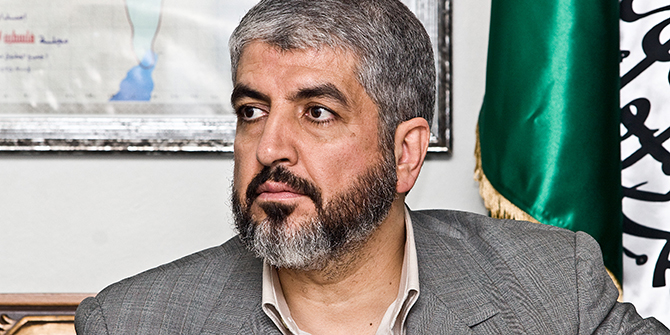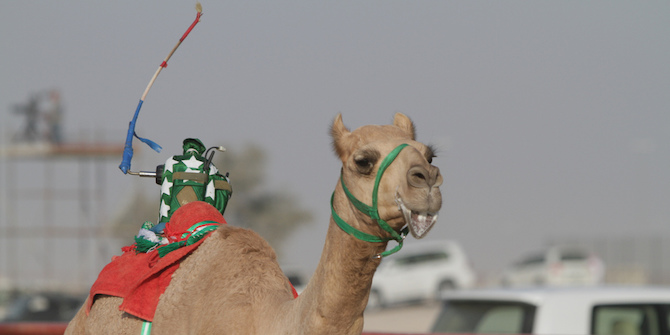by Courtney Freer

The latest intra-GCC row between Qatar and its neighbours differs in intensity than the previous 2014 row, yet not in root cause. In both cases, Qatar’s support, whether tacit or active, of Islamist groups in the Middle East, particularly the Muslim Brotherhood, has led to its alienation from its neighbours, especially Saudi Arabia and the UAE. The hacking of Qatar News Agency (QNA) late last month, which led to the posting of pro-Iranian rhetoric from Qatar’s Emir was used as the initial reason by several GCC countries for isolating the state once again, even though it is fairly certain that the statement was never made. No Arab ruler, even one who shares a gas field with the Islamic Republic, would publicly dub Iran ‘an Islamic power’, especially immediately following Donald Trump’s trip to Saudi Arabia which garnered support for isolating Iran. Further calling into question the veracity of claims that the statements are legitimate, Sheikh Tamim did not speak at the graduation ceremony for army recruits which is cited as the source of the statements.
Despite initial headlines highlighting the Iran portions of the false statements, the rhetoric has now changed to focus on Qatar’s support for Islamist groups, since Sheikh Tamim, in the statements on QNA, allegedly dubbed Hamas, whose leadership has found refuge in Qatar, the official representative of the Palestinian people. Immediately following this leak, Bahrain, Egypt, Saudi Arabia and the UAE withdrew their ambassadors from Doha, while Qatari officials continued to deny the veracity of the statements on QNA’s website.
As of Monday, Bahrain, Egypt, Libya, the Maldives, Saudi Arabia and the UAE had broken off ties with Qatar, on grounds that it was destabilising the region through its support for terrorist organisations. The Gulf states announced suspension of air, sea and land links with their neighbour and are requiring that Qataris return home within fourteen days. The UAE and Saudi Arabia went so far as to stop exports of white sugar to import-dependent Qatar. While ambassadors were also removed in the 2014 row, the crisis did not reach this level.
A great deal of previous analysis has charged that Qatar is being punished for having ‘punched above its weight’ by challenging Saudi policies of isolating Iran and Islamists. This is only half the story. Qatar is not as regionally irrelevant as is often portrayed. Egypt, Saudi Arabia and the UAE remain dependent on Qatar for their supplies of liquefied natural gas (LNG); Al Jazeera reaches millions around the world on a daily basis, although it is blocked in some Gulf states; and the largest concentration of American military personnel (some 11,000 total) is in Al Udeid Air Base. Further, though it often goes unnoticed, Qatar has become a hub for peaceful Islamist activity that is relevant throughout the Middle East, whether the Saudis and Emiratis want to acknowledge it, so it has accrued substantial social and spiritual capital by hosting websites like IslamOnline and IslamWeb. As I have written elsewhere, it is Islamist groups, like the Brotherhood, that are best placed to challenge wealthy rentier governments of the Gulf, since they are united by a common ideology and since these states cannot be challenged on the basis of economic complaints. Further, because Brotherhood ideology can survive even without a definite structure, it is particularly difficult to root out, which is perhaps why the Qataris have chosen to co-opt it by embracing certain forms of Islamism rather than attempt to crack down on it.
Emboldened by a visit by US President Donald Trump, whose administration has pondered designating the Muslim Brotherhood a terrorist organisation, the Saudi government has doubled down on its anti-Qatar rhetoric, further bolstered by support from the UAE. But tensions had certainly been building. In fact, it is likely that the Saudi-led coup against former Emir Sheikh Hamad bin Khalifa al-Thani in 1996 led him to pursue a policy towards Islamists completely different from the Saudis, choosing to co-opt and cooperate with them rather than attempt to dismantle their organisations.
Over the past month, tensions have built, bringing back old issues to the fore. For instance, in May, Qatar hosted a Hamas meeting wherein it introduced a political programme considered to soften its image as a terrorist or extremist organisation, since it included acceptance of the Palestinian state along 1967 borders. At the end of May, the Saudi Minister of Islamic Affairs demanded that Qatar change the name of its state mosque, which is now dubbed Sheikh Muhammad Ibn Wahhab Mosque, amid claims that al-Thani ruling family is not descendant of al-Wahhab (Qatar and Saudi Arabia are the only countries whose official religion is Wahhabism). Statements from Qatari Foreign Minister Sheikh Muhammad bin Abdulrahman al-Thani in mid-May supporting negotiations between the GCC and reaffirming that Qatar has not banned the Muslim Brotherhood did not help ease existing tensions. While stating that ‘we do not, will not, and have not supported the Muslim Brotherhood’, Minister al-Thani was also unapologetic about Qatar’s policy of ‘support[ing] any individual that assumes the presidency in Egypt in a clear and transparent manner’.
Egypt, Saudi Arabia and the UAE have designated the Brotherhood a terrorist organisation; these are also, critically, the Middle Eastern states upon which Donald Trump is likely to rely the most for his policies in that region. Abu Dhabi Crown Prince Mohammed bin Zayed (MbZ) perhaps holds the strongest opinion about the Muslim Brotherhood. His policy towards Islamists lacks such nuance that the US Department of State noted that he referred to all Islamists as Muslim Brotherhood, according to a Wikileaks document. And, as early as 2009, before the Brotherhood had won any major national elections, another Wikileaks document revealed that ‘being labeled a Muslim Brotherhood is about the worst epithet possible in MbZ vocabulary’. Further, while it has been posited that Saudi Arabia’s stance towards the Brotherhood has softened under King Salman, Deputy Crown Prince Mohammed bin Salman spoke about Usama bin Laden’s ties to the Brotherhood during the American President’s recent visit to the Kingdom, perhaps reflecting a turn against the group as potentially destabilising.
Palestinian sources said on Monday that several top Hamas officials had been asked to leave Qatar, in a bid to mediate the diplomatic crisis. While the expulsion of members of the Muslim Brotherhood helped in negotiations of the 2014 crisis, these limited deportations do not appear to have moderated the crisis in 2017. Kuwaiti efforts at mediation last week similarly failed, yet Qatar on Tuesday affirmed its desire for a Kuwait-mediated solution. It is uncertain, though, what its Gulf neighbours will require of Qatar to end the row, and whether Qatar will choose to use its leverage as a means of reaching settlement. An article last year in The Intercept revealed that claims by Italian security expert Simone Margaritelli that an Emirati-sponsored firm tried to recruit him to create a group of hackers, suggesting that perhaps the hackings of QNA could have been the result of a broader campaign against Qatar. Though much remains uncertain as of yet, the one thing that has been made clear in this latest row between Qatar and its neighbours is that Islamism is far from dead.






